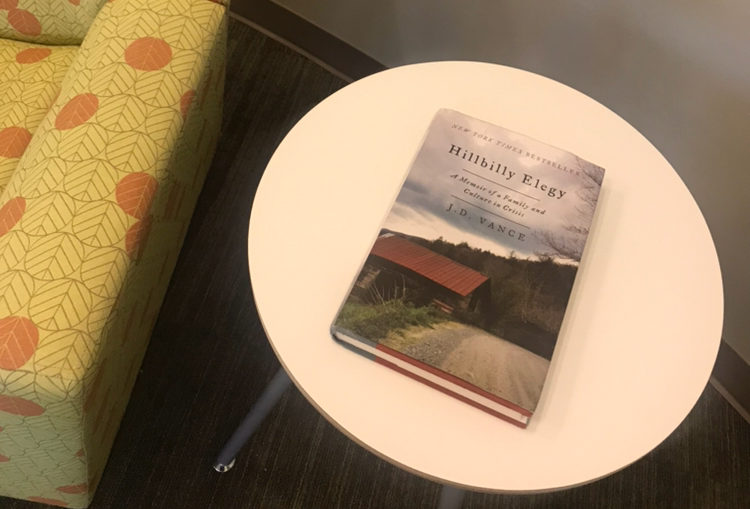Frederick Community College students filled a Conference Center room to capacity during a discussion of Hillbilly Elegy in which students shared their personal stories of trauma and resilience.
Facilitated by Professors Delaine Welch and Ramon Jones, the event titled “Broke: Investigating Spiritual and Material Poverty” kicked off a semester-long discussion series centered on J.D. Vance’s bestselling memoir about his childhood and adolescence in Appalachia. The kick-off event spanned topics such as wealth gaps, adverse childhood s, and sources of hope.
“Be prepared for some possible discomfort,” Welch urged the crowd, which spilled out into a hallway.
For an hour, students and faculty representing an array of disciplines, including math, English, and education, discussed the intersection of Vance’s memoir with their lives.
“What does it mean to be broke,” asked Professor Andrea Dardello, who teaches in the English department and serves this semester as the Campus Book Discussion Coordinator. Under Dardello’s leadership, a team of administrators and faculty across disciplines planned the discussion series, which ends on April 12. There will be three more formal discussions of Hillbilly Elegy this semester.
Audience members expressed what “broke” means to them. Poor relationships, low self-esteem, lack of material goods, homelessness, and hopelessness were ideas that came to mind.
According to Jones, Frederick County has 10,000 people living below the poverty line, a third of which are under the age of 18. Welch added that 75 percent of people on food stamps have jobs, but do not make enough money to survive. She said that 800 students within the Frederick County Public School system are homeless and 61 out of 66 county schools have a homeless population.
After hearing these statistics, students in the crowd shared their personal experiences.
“Depending on how bad your situation is, people will do anything,” said Leah Tester.
Despite the large number of students in attendance, fewer than 10 raised their hands to say they understood the level of poverty within their own community.
A student who identified only by her first name, Erin, said “I’m from a wealthy family. I never really paid attention to the poverty in Frederick. I never really thought there was any.”
Next, facilitators offered the audience an interactive quiz that assessed adverse childhood experiences, also known as ACEs. Researchers have defined ACEs as any type of toxic trauma or serious stress before the age of 18, Welch said.
She stated that resilience is one powerful antidote in reversing the effects of ACEs, and referenced stories that students had previously shared about overcoming barriers. They contended with the question of how a person’s past experiences define their present and future. Students told their stories of overcoming difficult situations such as disabilities, familial dysfunction, and difficult childhoods.
“How do we break these cycles?” asked Jones. Students spoke with candor about what may have been the hardest times of their lives, and how they rose above them. Many stories were so inspiring the audience was moved to applause.
“What a lot of you showed today is resilience,” said Welch. “and that’s something to be really proud of.”
A second campus book discussed, “Success as Luck or Hard Work: Creating Our Own American Dream” was held on March 6. The next discussion, “Pessimism and Resistance of the White Working Class,” will be held from 2-3:15 p.m. on March 20 in E126ABC.

